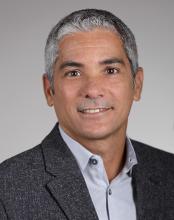
Eric Calvo, Ph.D.
“A good mentor provides lifelong lessons”
National Institute of Allergy and Infectious Diseases
Dr. Eric Calvo was born and raised in Havana, Cuba. He received his B.Sc. in Biochemistry from the University of Havana, Cuba and his Ph.D. from the University of Sao Paulo, Brazil. He did postdoctoral work at the University of California, Irvine, and at the National Institute of Allergy and Infectious Diseases, before becoming a staff scientist first at the Food and Drug Administration and then at NIAID in the Laboratory of Malaria & Vector Research, where he is now a Stadtman tenure track investigator. The overall objective of his research is to understand the mechanisms of vector-host and vector-pathogen interactions at the biochemical and molecular level, ultimately aiming to develop new control strategies to reduce or eliminate vector-borne diseases.
As a boy, Eric Calvo wasn’t satisfied with toys straight out of the box. He preferred taking them apart, then fitting the pieces back together himself: perhaps a preview of his future life in the lab. Today, dissecting apart relationships between pathogens and their vectors to understand mosquito-borne diseases, the toys are much more dangerous but “playing with them” (safely!) is still an immensely satisfying exercise for him.
Now a Stadtman tenure-track investigator at NIH’s National Institute of Allergy and Infectious Diseases, Calvo grew up in sunny and vibrant Havana, Cuba, and always remembers loving chemistry and wanting to understand how molecules work. His passion for research led him to a fellowship in Brazil, and eventually to the United States to study molecular biology and mosquito genetics. But, a key step along the way provided a crucial push. During his first summer internship working in an organic chemistry lab, Calvo was in charge of washing glassware, and he spent days cleaning beakers, coffee mugs, and everything in between. Calvo grew frustrated, yearning for the thrill of discovery to replace the drudgery of cleaning the lab.
Later that summer, his work ethic paid off – his mentor encouraged him to begin studying soil samples. This experience changed his life – not only did Calvo fall in love with chemistry, but he also learned an important aspect of science that has remained with him. Working in a lab doesn’t only involve research, but also requires lots of organization and preparation. He also encourages others to have a personal life outside the lab, something he says he learned from experience is crucial to succeed in research.
Calvo remembers what he learned during that first summer internship, and at NIH he enjoys paying it forward by supervising and mentoring students. To him, a good mentor is someone who provides lifelong lessons: tools and strategies for current and future success, well beyond their time at NIH.
At NIH, as part of the Distinguished Scholars Program, Calvo is committed to promoting diversity and inclusion. Especially for infectious disease research, he believes that scientists who arrive at the lab from places around the world affected by the diseases under study bring a different and much-need perspective to asking scientific questions.
For his part, when he is not in the lab, Calvo enjoys spending time with his family and playing soccer and baseball with his son and daughter. He also loves cooking: his specialty is Cuban slow-roasted hog and coconut flan!

Catherine Cukras, M.D., Ph.D.
“Science provides a universal language”
National Eye Institute
Dr. Catherine Cukras grew up in Westchester, New York. She was a chemical engineering major at Princeton University, and received her M.D. and Ph.D. degrees at Washington University. She completed a residency in ophthalmology at the Scheie Eye Institute at the University of Pennsylvania and a medical retina fellowship at the National Eye Institute. As a Lasker Clinical Research Scholar and tenure track investigator at NEI, she is interested in understanding retinal disease from clinical study, particularly retinal degenerations spanning monogenetic disease as well as age-related macular degeneration, to provide insights into disease pathogenesis and developing outcome measures for clinical trials.
As an undergrad at Princeton, Catherine Cukras studied chemical engineering because she enjoyed the combination of problem-solving and team projects inherent to the major. Yet wanting more focus on biology and helping humans, she earned Ph.D. and M.D. degrees and began a research program studying eye diseases.
Now, Dr. Cukras’ research at NIH’s National Eye Institute as a Lasker Clinical Research Scholar and tenure-track investigator strikes a balance between problem-solving and making a difference in the lives of others. She studies retinal degeneration, but because many retinal diseases do not have adequate animal models, Cukras is committed to clinical research with patients to clarify outcome measures toward future research and therapies.
Cukras views fluid exchange of ideas as critical and synonymous with scientific discourse. Because we all have different training and perspectives, she says, such exchanges between colleagues become richer. Cukras welcomes such discourse: “Science provides a universal language common to everyone at NIH, and being open and receptive to discussing topics is an obvious first step to developing rapport.” Knowing your opinions and perspectives will be well-received invites lab members to broach new subjects without fear, she adds.
At NIH, and as one of the inaugural members of the NIH Distinguished Scholars Program, Cukras feels united with her fellow scientists and researchers because of a shared desire to improve health outcomes: “My colleagues may come from different backgrounds and have different scientific interests. They may be basic scientists or clinical researchers. But what drives us all is everyone’s desire to protect and improve health by understanding and treating human disease.”
Cukras loves spending time with her husband, three kids, and their puppy. Creating and being part of an environment that allows her family to thrive and find happiness takes work – but she considers it an intrinsic part of integrating work and personal time. Cukras also combines friendships and exercise via pre-dawn runs with a neighborhood women’s running group.
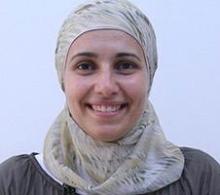
Sherine El-Toukhy, Ph.D.
“I consider mentees an academic family”
National Institute on Minority Health and Health Disparities
Dr. Sherine El-Toukhy was born and raised in Cairo, Egypt. Her bachelor's and master's degrees in communication are from Cairo University, Egypt, and her doctoral degree, also in health communication, is from the University of North Carolina at Chapel Hill. She completed her postdoctoral work at the National Heart, Lung, and Blood Institute and the National Institute on Minority Health and Health Disparities, where she is now an Earl Stadtman tenure track investigator. Her research program is aimed at improving minority health and reducing health disparities through digital public health interventions.
A child of professors, Sherine El-Toukhy grew up listening to her parents’ discussions of research, publications, faculty meetings, and dissertation defenses.
Today, when mentoring students at NIH, Dr. El-Toukhy emulates her parents’ approach: considering graduate students as an academic family. In El-Toukhy’s doctoral program, her Ph.D. chair invested in her success, making her feel like she had an “academic mom” and “academic siblings.” When treated as family, she says, mentees give it their all – they succeed, and a mentor’s successes continue through his or her mentees’ successes. It’s a cascade of effort and progress.
Needless to say, El-Toukhy’s parents greatly influenced her choice to pursue a career in science and research. Now as a Stadtman tenure-track investigator at the National Institute on Minority Health and Health Disparities, El-Toukhy’s research involves using information technology to understand and improve minority health, toward reducing health disparities. In one recent study, for example, she showed that Hispanic youth are consistently more susceptible to smoking than their non-Hispanic White counterparts. She wonders: Are there effective ways to target vulnerable populations via tailored interventions?
Born and raised in Cairo, Egypt, El-Toukhy received her bachelor’s and master’s degrees in communication from Cairo University, Egypt. She then attended the University of North Carolina at Chapel Hill and received her doctoral degree in health communication. Today at NIH, El-Toukhy is able to conduct high-risk, high-reward research by working with transdisciplinary teams – something she says allows her research to have real-life broad impact.
There is no doubt that diversity and inclusion are critical to the scientific workplace, she says. “Diversity and inclusion are the best strategies to professionally ensure team creativity and productivity, as well as to morally erase decades of underrepresentation of certain groups in science now and always.”
When she’s not conducting research, El-Toukhy enjoys spending time with her family.
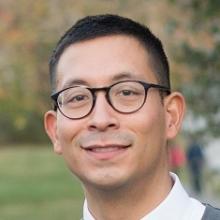
Freddy Escorcia, M.D., Ph.D.
“A valuable mentor has self-awareness and humility”
National Cancer Institute, Center for Cancer Research
Dr. Freddy Escorcia was born and spent his early childhood in Nicaragua, moving later to Toronto, Canada and then to Peoria, IL. He obtained undergraduate bioengineering and chemistry degrees at the University of Illinois at Urbana-Champaign, and his M.D. and Ph.D. degrees at the Tri-Institutional MD-PhD Program of Weill Cornell Medical College, Memorial Sloan Kettering, and The Rockefeller University. He completed Radiation Oncology residency and postdoctoral work at Memorial Sloan Kettering. He is an Assistant Clinical Investigator at the National Cancer Institute within the Radiation Oncology Branch and Molecular Imaging Program, and runs the Laboratory of Molecular Radiotherapy, developing new methods for diagnosing and treating hepatobiliary malignancies.
For much of his life, Freddy Escorcia found solace reproducing the world around him through sketches. He enjoyed both the methodical nature of capturing the identity of his surroundings and the invention involved in sketching something from his imagination. This dual sense of precision and creativity led him to research. Today at the National Cancer Institute's Center of Cancer Research, Dr. Escorcia designs tumor-specific imaging probes with the aim of better identifying, diagnosing, and treating hepatobiliary cancers.
Escorcia was born and spent his early childhood in Nicaragua. As political refugees, he and his family moved first to Toronto, and later to the United States: to Peoria, Illinois. While he attended the University of Illinois at Urbana Champaign with the plan of pursuing medical school, Escorcia grew increasingly excited about science, and switched out of his biology major to pursue a double major in bioengineering and chemistry. He spent two summers at NIH as part of the undergraduate scholarship program where he worked with noted intramural scientist Dr. Susan Gottesman. This, he says, was a crucial step in his path to NIH.
Now an NIH Assistant Clinical Investigator with Gottesman as a colleague, Escorcia takes full advantage of the natural collaborations that develop at NIH. Its many offerings allow him and other scientists to think creatively and better use their resources. At NIH, he has the freedom to conduct research that may in other settings be considered too high-risk for advancing his career.
Growing up in multiple environments, Escorcia learned how to adapt quickly to change. Being able to adjust to new conditions has benefitted him tremendously throughout his career and has also made him particularly aware of the importance of inclusivity. As a result, he goes out of his way to make others feel welcome and part of a/his group.
As a member of NIH’s Distinguished Scholars Program, Escorcia he believes that by limiting the types of people participating in scientific research and science in general, we risk overlooking new, innovative solutions to problems that may be obvious to others from different backgrounds. In order for scientists to do their best possible work, he says fostering a diverse and inclusive environment is critical.
He also spends time mentoring and supervising students at NIH. To Escorcia, a valuable mentor needs to have self-awareness, humility, and a willingness to tailor how he or she engages with and supports mentees.
When he’s not in the lab, Escorcia loves spending time with his wife and two daughters and reading.

Sadhana Jackson, M.D.
“NIH is an unparalleled place to do research”
National Cancer Institute, Center for Cancer Research
For Dr. Sadhana Jackson, cancer has always been at the forefront of family life, even discussed routinely at the dinner table. She grew up with the reality of having numerous family members diagnosed with the disease, and now Jackson herself is a young adult cancer survivor.
Combined with a lifelong passion for science, it’s unsurprising then that Jackson has devoted herself to making a difference in oncology research. She’s now an Assistant Clinical Investigator within the Neuro-Oncology Branch of the National Cancer Institute. Her research focuses on how to effectively break down the brain-blood barrier temporarily to better treat brain tumors in children.
Growing up in Gaithersburg, Maryland, Jackson attended various math and science summer camps, seeing first-hand what scientists actually do in a lab. These early experiences sparked her interest in research. But that wasn’t enough for her: Jackson realized that by solely focusing on research she was missing something that had drawn her to science in the first place – interacting regularly with patients. She decided to attend medical school and began her career in pediatrics.
Jackson enjoys doing research at NIH because of everyone’s willingness to share their expertise and provide insight into how to tackle tough scientific problems. After arriving at NIH, she distinctly remembers immediately seeking out brain-blood barrier experts and being met with a sincere and genuine investment in seeing her succeed. To her, that sums up NIH and makes it an unparalleled place to do research.
On mentorship: “Being down to earth is a key attribute of a good mentor,” says Jackson, as is just stepping back and listening. She stresses the importance of an open line of communication in a mentor-mentee relationship, and she remarks that her mentees keep her grounded. Humor also helps: To make others feel welcome in the lab, Jackson says she likes telling corny jokes.
As a member of NIH’s Distinguished Scholars Program, Jackson is committed to diversity and inclusion, and she views these values as crucial to science: “When you are bringing together people who have different life experiences, exposures, and upbringings, you will have ideas that are significantly richer.”
When she’s not conducting science, you can find her enjoying time with her friends and family and playing board and card games.

Jennifer Jones, M.D., Ph.D.
National Cancer Institute, Center for Cancer Research
Dr. Jennifer Jones grew up in Chattanooga, Tennessee, majored in chemistry and biophysics at Princeton University, and then completed graduate, medical and postdoctoral training in immunology, genetics, cancer biology, and radiation oncology at Stanford University. She spent a year at Dana-Farber Cancer Institute as a Research Fellow before joining the National Cancer Institute as an Assistant Clinical Investigator and Staff Clinician. She is now a Stadtman tenure track investigator whose laboratory research bridges the fields of immunology, cancer, molecular genetics, and extracellular vesicles, in a comprehensive way to develop and investigate exosomes as packets of information that can be used to monitor treatment or adjust responses to immune based therapies.

Paule Joseph, Ph.D.
“Differences aren’t something to be fixed”
National Institute of Nursing Research
Dr. Paule Joseph was born and raised in Venezuela of Haitian parents and moved to attend college in the United States. She obtained an associate’s degree in nursing at Hostos Community College, a bachelor’s degree in nursing at College of New Rochelle, and a Master’s degree from the Family Nurse Practitioner Program at Pace University, followed by a Ph.D. from the University of Pennsylvania. She did postdoctoral work at the National Institute of Nursing Research, where she is now an Assistant Clinical Investigator. Her research focuses on understanding the fundamental mechanisms associated with chemosensory variations and alterations that occur in metabolic conditions such as obesity and Type 2 diabetes, with the aim of improving the diagnosis, prevention, and management of chemosensory disorders and symptoms.
Growing up in a family of nurses, Paule Joseph always knew she wanted to be one herself. In nursing she saw the opportunity to pursue many interests – scientific research, education, caring for others, and improving health. Now, Dr. Joseph studies the neurobiology of eating behaviors related to individual differences in taste and smell in metabolic disorders. Her research interests grew directly from interactions with diabetic, overweight, and obese patients undergoing bariatric surgery, which led her to appreciate the complexity of health conditions that affect millions of Americans.
Born to Haitian parents, Joseph was born and raised in Venezuela, where in high school she developed a keen interest in research and health. She moved to the United States to attend college, and then nursing school, and research continued to call her name. She earned a Ph.D. in nursing/genomics from the University of Pennsylvania where she also specialized in sensory biology.
Continuing that research as an Assistant Clinical Investigator at NIH’s National Institute of Nursing Research, Joseph has been at NIH through several different internships, volunteer, and staff positions. Joseph stresses NIH’s unparalleled resources and collaborative spirit. Because science takes many minds to create better health outcomes, NIH allows people to come together and do just that.
“Diversity in science is critical,” says Joseph. Yet, diversity alone isn’t enough.
“Like in a choir, diverse voices make rich music,” she explains. “But diversity is like being invited to the choir – inclusion is actually being asked to sing.”
Joseph believes that through the Distinguished Scholars Program, NIH is cultivating a culture that embraces diversity that will endure – by creating a structure that could be adopted by other institutions around the country and the world.
She leads by example. In the lab, Joseph actively speaks about diversity and why it is important, exemplifying the vital element of inclusion. She emphasizes the importance of teaching others that differences aren’t something to be fixed, but rather that they bring much-needed perspectives to science.
When she is not in the lab, Joseph enjoys traveling, studying history, reading, and giving back to the community. She is Vice President of the Amazing Children’s Foundation, a nonprofit that helps underprivileged and underserved children around the world by bringing medical care to communities in need and was recently appointed as Director of Mentorship and Career Development for The African Research Academies for Women. Joseph loves learning about other cultures and is always trying to learn new languages (meet her and ask her which ones she speaks!)
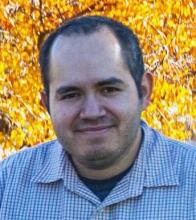
Joseph Rodriguez, Ph.D.
“Mentoring cannot be a one-size-fits-all approach”
National Institute of Environmental Health Sciences
Dr. Joseph Rodriguez was born in White Plains, NY. He has a B.S. degree in Biology from the Massachusetts Institute of Technology, an M.S. degree in Bioinformatics from Boston University, and a Ph.D. in Molecular and Cell Biology from Brandeis University. He completed his postdoctoral training at the National Cancer Institute. As a tenure track investigator at the National Institute of Environmental Health Sciences, he is interested in understanding the mechanisms of stochastic gene expression in single live cells. He is specifically interested in how expression heterogeneity is regulated and its impact on cell function and disease.
“Despite millions of years of evolution, we’ve only had a few thousand years of scientific exploration,” says Dr. Joseph Rodriguez, a tenure-track investigator at the National Institute of Environmental Health Sciences and one of the inaugural class of the NIH Distinguished Scholars Program.
He explains: At first glance, DNA is a static blueprint for every living thing. However, there is significant amount of complexity and dynamics in gene expression. His research aims to untangle expression heterogeneity – why do genes in some cells get turned on while the same genes in others do not? What features of our environments and our bodies control these differences? What are the effects on health and disease?
Rodriguez grew up in White Plains, New York. Early in his career, he worked on the Human Genome Project, and during that time he also received a master’s degree in bioinformatics and worked in the bioinformatics core at the Whitehead Institute in Cambridge, Massachusetts, for several years. Today, as a basic scientist, Rodriguez takes full advantage of NIH’s outstanding resources and unique mixture of clinical, translational, and basic science. He also sees endless opportunities to better himself as NIH: “One of the best aspects of NIH is the variety of training programs available for trainees of all levels, ranging from undergraduate internships to postdoctoral programs to tenure-track investigator programs.” All these opportunities allow students and scientists to network and improve their science.
As a member of NIH’s Distinguished Scholars Program, Rodriguez believes having different points of view and backgrounds makes everyone better. Workplaces reflecting and representing the diverse world in which we live is crucial, he says, adding that equally as important is examining differences in representation and looking into the systemic issues that are preventing widespread diversity and inclusion.
Rodriguez believes that diversity also prepares mentees to interact with the international scientific community – something he views as important for succeeding in science. In addition to cultivating an inclusive and diverse work environment, he points out two vital elements of being a good mentor. First, mentors must foster independence by encouraging mentees to make decisions and learn from the outcomes. Second, mentors need to take feedback and constantly refine their philosophies to tailor guidance to each mentee. Because no two people or career paths are the same, a mentoring strategy cannot be a one-size-fits-all approach.
When he is not doing research, Rodriguez likes spending time with his family and friends and cooking new foods.

H. Nida Sen, M.D.
“NIH offers endless opportunities to improve patient outcomes”
National Eye Institute
Dr. H. Nida Sen was born and raised in Turkey. She obtained her M.D. degree from Hacettepe University of Turkey and a Master of Health Sciences from Duke University. She completed her ophthalmology residency at George Washington University and her uveitis fellowship at the National Eye Institute. She is a Lasker Clinical Research Scholar and tenure track investigator at NEI. Her primary interest is early phase clinical trials and the current focus of her research is molecular categorization of uveitis as well as understanding the role of the gut microbiome in autoimmune uveitis. She is also the Director of the Uveitis Clinic and the Uveitis and Ocular Immunology Fellowship Program at NEI.
Born and raised in Turkey, Nida Sen decided on science and medicine early – straight out of high school as is common in Europe. Research became her whole life since during medical school, when she studied immunology and spent summer vacations working in the lab.
During her residency in Turkey, Dr. Sen chose ophthalmology because of it being a field of study amenable to both clinical and surgical approaches and one enabling her to ask a range of scientific questions. Sen’s yearning for knowledge solidified her desire to train in the United States, taking her to Duke, George Washington University, and ultimately to NIH. She considers herself lucky to work at NIH early in her career under the tutelage of internationally known experts and great mentors.
Now at NIH’s National Eye Institute as a Lasker Clinical Research Scholar and tenure-track investigator, Sen focuses her own research on inflammatory diseases of the eye with a particular focus on improving treatment outcomes.
The opportunity to combine patient care and research is what attracted Sen to NIH in the first place – NIH’s strong research infrastructure and world-renowned expertise on campus makes it an amazing place to do research, she says. Because of the constant cross-pollination between basic and clinical science, NIH offers endless opportunities to improve patient outcomes.
As a member of the NIH Distinguished Scholars Program, Sen believes that cultivating diversity enriches her work environment by bringing together people of different mindsets and backgrounds. In fact, she distinctly remembers enjoying NIH’s diversity during her fellowship because of this intensely collaborative spirit. In the lab, Sen says she draws on her personal experience of being from a different background to make others feel comfortable and welcome.
When she’s not doing research, Sen loves cooking and traveling. You can also find her unwinding with yoga, Pilates, and other forms of exercise.
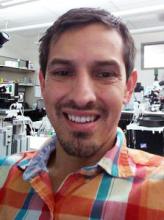
Hugo Tejeda, Ph.D.
“Life comes in many diverse forms”
National Institute of Mental Health
Dr. Hugo Tejeda was born in Juarez, Mexico, and grew up there and its sister border city, El Paso, TX. He completed undergraduate degrees in Biological Sciences and in Psychology at the University of Texas at El Paso, his Ph.D. in Neuroscience at the University of Maryland School of Medicine and at the National Institute on Drug Abuse, and a post-doctoral fellowship at NIDA. He is a Stadtman tenure track investigator at the National Institute of Mental Health interested in understanding how the brain utilizes neuromodulation in motivational and emotional neural circuits to process information and orchestrate behavior. He is also interested in identifying plastic changes in neuromodulation and synaptic integration, using animal models to elucidate novel therapeutic targets to treat psychiatric disorders and increase our understanding of conventional therapies.
After interacting with many people with psychiatric disorders, neuroscientist Dr. Hugo Tejeda grew frustrated at the lack of understanding of – and inadequate treatments for – these common but debilitating illnesses of the brain. Now as a Stadtman tenure-track investigator at the National Institute of Mental Health, Tejeda is using an interdisciplinary approach to research the neuronal circuitry that drives emotional and motivated behavior. He wants to find new ways to treat psychiatric disorders and to increase our understanding of conventional therapies.
Tejeda grew up in two different countries simultaneously – he was born in Juarez, Mexico, and spent his childhood there as well as in its sister city of El Paso, Texas. Tejeda did undergraduate research at the University of Texas at El Paso in a lab that studied drug addiction because of his interest in understanding how addiction influences psychiatric disorders. He began focusing on psychiatric disorders in graduate school – turning his focus to drug addiction, schizophrenia, and opioid receptors in the cerebral cortex. He then continued this research as a postdoc at the National Institute on Drug Abuse.
As a member of NIH’s Distinguished Scholars Program, Tejeda views diversity and biology as interconnected: “One goal of biology is to understand life itself, and life comes in many diverse forms. It’s only right to promote scientific endeavors that make science accessible to people of different races, religions, sexual orientations, and economic backgrounds.” While there has been a lot of progress in society to improve diversity within the “pipeline” (students and other trainees), Tejeda says programs like the Distinguished Scholars Program are critical to increase diversity at the level of faculty and beyond. He hopes that the Distinguished Scholars Program will spread beyond NIH to other institutions.
NIH encourages scientists to think outside the box to make advances in understanding biology and treating diseases, Tejada says, adding that because of NIH’s vast resources and experts, scientists can pursue research they consider important to society while growing as a scientist alongside their colleagues.
Outside the lab, Tejeda enjoys spending time with his family and staying active by playing sports with his kids.
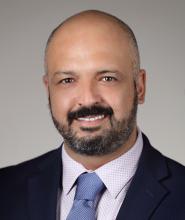
Joel Vega-Rodriguez, Ph.D.
“I view each idea as important”
National Institute of Allergy and Infectious Diseases
Dr. Joel Vega-Rodriguez was born in Humacao, Puerto Rico. He earned his Ph.D. in Molecular Biology at the Rio Piedras Campus of the University of Puerto Rico in San Juan and completed his postdoctoral training at the Johns Hopkins Malaria Research Institute. He is a Stadtman tenure track investigator in the Laboratory of Malaria and Vector Research at the National Institute of Allergy and Infectious Diseases. His current research focuses on characterizing host-parasite and mosquito-parasite interactions required for transmission of the malaria parasite, specifically the interaction of the malaria sporozoite with the human fibrinolytic system and its role during parasite infection of the human and the mosquito.
Humacao, Puerto Rico, was one of the cities devastated by Hurricane Maria in September 2017. Despite the catastrophe, its close-knit residents organized immediately to help those in need after the huge storm bashed this city tucked away in the mountains facing the Atlantic Ocean.
Dr. Joel Vega-Rodriguez, who grew up there but now lives in Maryland and is now the first Puerto Rican Stadtman tenure-track investigator at NIH’s National Institute of Allergy and Infectious Diseases (NIAID), wasn’t surprised at the community’s strong will to help the vulnerable. This was a trait ingrained in him at a young age.
Through Vega-Rodriguez’s research on the malaria parasite, he is trying to develop new strategies and treatments to combat the transmission of this disease that is a deadly force in tropical and sub-tropical regions in the world, like his home country. Vega-Rodriguez’s motivation to study malaria is also driven by the statistics of the disease – annually, malaria affects more than 200 million people worldwide, most of whom are children under five years old. The disease’s shocking toll and its impact on some of the most vulnerable led Vega-Rodriguez to the University of Puerto Rico and eventually to the Johns Hopkins Malaria Research Institute, where he did a postdoctoral fellowship with Dr. Marcelo Jacobs Lorena.
Now in the NIH intramural research program and as part of NIAID’s Laboratory of Malaria and Vector Research, Vega-Rodriguez says this unique environment provides him with tools and resources to do impactful research in biomedical science. Because NIH’s scientific environment is so diverse, Vega-Rodriguez finds it easy to collaborate among different disciplines and scientists. He also appreciates NIH’s outstanding resources, like the Distinguished Scholars Program, which among other things, supports the professional development of scientists like himself.
Vega-Rodriguez is committed to diversity and inclusion in the scientific workplace. To him, both diversity and inclusion increase the breadth of ideas related to science and promote an environment of tolerance and inclusion. A welcoming work environment makes employees feel valued and respected, which stimulates employee engagement and increases productivity.
Vega-Rodriguez emphasizes listening to diverse perspectives while working in the lab: “When I interact with someone from a different background or different area of research, I make sure to listen to their point of view and consider them as a peer,” adding “I am careful to view each idea as important,” which he says makes his mentees and other people in the lab feel like a team.
Outside the lab, Vega-Rodriguez enjoys spending time with his family and friends, scouting out restaurants, and trying new foods.
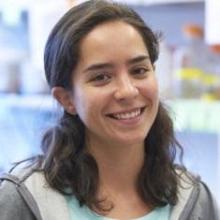
Joana Vidigal, Ph.D.
“Strategies may be overlooked if a team is too homogenous”
National Cancer Institute, Center for Cancer Research
Dr. Joana Vidigal was born in Lisbon, Portugal. She completed undergraduate studies at the University of Lisbon and at the University of Aarhus in Denmark and received her doctoral degree at the Max-Planck Institute in Germany. She carried out postdoctoral research at Memorial Sloan Kettering. As a Stadtman tenure track investigator in the Laboratory of Biochemistry and Molecular Biology in the National Cancer Institute, her goal is to use experimental and computational CRISPR tools together with her expertise in mouse modeling, tumor biology, and embryonic development to study the noncanonical mechanisms through which Argonaute proteins and other components of the RNAi pathway regulate animal physiology and disease.
Research benefits from all kinds of diversity, says Dr. Joana Vidigal.
Take, for example, having both a bioinformatician and a molecular biologist working on the same team. The molecular biologist might figure out an innovative way to generate data under a certain set of conditions, whereas the bioinformatician might devise a clever strategy to analyze data another researcher had collected. Both approaches can provide different outcomes and insights – and be synergistic.
Or what about age and experience? According to Vidigal, sometimes undergraduate and postbac researchers challenge concepts that have been taken for granted by other lab members but are not necessarily held by strong data. Younger researchers benefit by having senior lab members as mentors to help them distinguish between concepts that are well established and supported by a wealth of data from the ones that are not.
Generally speaking, she says, diversity allows scientists to look at research questions from multiple points of view, come up with different hypotheses, and suggest new strategies to address them. All of these may be overlooked if the team is too homogenous.
Vidigal was born in Lisbon, Portugal, completed her undergraduate studies at the University of Lisbon and at the University of Aarhus in Denmark, and received her doctoral degree at the Max-Planck Institute in Germany. Today, she is a Stadtman tenure-track investigator at the National Cancer Institute’s Center for Cancer Research, studying the role of small-noncoding RNAs, which are turning out to be involved in many diseases like cancer. She is also one of the inaugural class of NIH’s Distinguished Scholars Program.
Throughout her career, Vidigal has focused on understanding gene regulation, working to decipher the mechanisms ensuring that genes are turned on and off correctly and at the appropriate time. She is searching for actionable knowledge that can be used to design better strategies for screening, prevention, and treatment of human diseases, like cancer.
Vidigal considers it critical to have individuals from different areas of the world working together: “People coming from different countries or communities often have developed specific problem-solving skills, levels of resourcefulness, or resilience – all of which are essential in a research setting.”
Vidigal takes advantage of NIH’s vast resources and experts, where there’s always someone nearby to ask for advice. She enjoys the large community of young scientists with whom she can interact. When she’s not researching gene regulation, Vidigal loves to travel. Sometimes that’s to visit her twin brother and an older sister, both of whom live in her hometown of Lisbon.

Faustine Williams, Ph.D.
“I can completely devote myself to research”
National Institute on Minority Health and Health Disparities
Dr. Faustine Williams was born and raised in Accra, Ghana. She received her bachelor’s degree from the University of Ghana, Legon, and master’s and doctoral degrees from the University of Missouri, Columbia. She was an assistant professor at Eastern Tennessee State University before joining the NIH as a Stadtman tenure track investigator. She is a trained transdisciplinary researcher with a focus on cancer prevention and control and health disparities, specifically interested in inter- and intra-health disparities in chronic diseases and finding ways to reduce and/or eliminate health disparities.
A native of Accra, Ghana, Dr. Faustine Williams remembers the seeds of her passion for helping people who are underserved and vulnerable. On her very first day of school, the younger Williams had lots of questions for her parents.
“Why did some of her fellow students have different clothing?”
“Why were some students treated differently according to their gender?”
“Why did some of them not have money for lunch?”
The very next day, Williams took extra clothes and food to school to share with her peers.
Today, as an intramural scientist at the National Institute on Minority Health and Health Disparities, Williams is dedicating her career toward reducing and/or eliminating disparities. She is conducting transdisciplinary research to understand the root causes of health disparities and exploring ways to intervene.
The many challenges and difficulties Williams encountered and observed while growing up in Ghana only solidified her desire to serve people from underrepresented groups who experience various disparities. Today, as a Stadtman tenure-track investigator and a member of the NIH Distinguished Scholars Program, Williams is having an important impact: addressing social problems and discrimination while also promoting diversity and inclusion in science. She believes that diversity and inclusion are essential for social development, as they promote cohesion and creative thinking. Williams says they can also work to eliminate misconceptions and prejudices that fuel discrimination.
NIH provides Williams not only the perfect environment to carry out research on public health and health disparities, but also allows for multidisciplinary collaborations within and across the NIH campuses – something she loves. Coming from academia and its many other non-research demands, Williams really appreciates how NIH and the Distinguished Scholars Program allow her to completely devote herself to research.
When she’s not doing research, Williams loves cooking food for her family and friends, meditating, and meeting new people and learning about their cultures.

